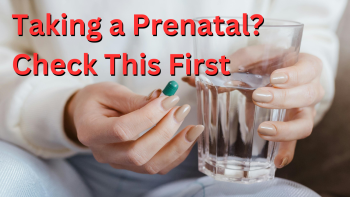If you’re trying to conceive or are already pregnant and taking a prenatal multivitamin, there’s something very important you need to check: does it contain folic acid?
Before you read further, I encourage you to grab your prenatal supplement and have a look at the ingredients. You'll soon understand why this matters so much.
Most prenatal supplements are high in vitamin B9, commonly referred to as folic acid. You might also hear it called folate or folinic acid — terms that are often used interchangeably but are not the same thing. Let’s break this down.
Why is vitamin b9 so important?
Vitamin B9 plays a vital role in pregnancy. It helps reduce the risk of neural tube defects in your developing baby. But it also supports the production of healthy new cells — including red blood cells, brain cells, and even cells for your skin, hair, and nails. Because you’re not just supporting your own body but growing a new one, your need for vitamin B9 dramatically increases during pregnancy.
Folate vs. folic acid: what's the difference?
- Folate is the natural form of vitamin B9 found in foods like leafy greens.
- Folic acid is the synthetic version found in most supplements and fortified foods.
When researchers first discovered the link between vitamin B9 deficiency and neural tube defects, supplementing with folic acid became common practice. Folic acid was easier and cheaper to manufacture — and, unlike natural folate, it was stable enough for supplements.
Here’s the catch: Neither synthetic nor natural folate is immediately usable by the body. Both must be converted through a series of steps into the bioavailable form called methylfolate.
The problem with folic acid
There are two key concerns with taking synthetic folate:
- Increased risk of gestational diabetes:
Research shows that high levels of folic acid (specifically the synthetic form) in the blood can raise your risk of developing gestational diabetes — a type of diabetes that occurs during pregnancy. Gestational diabetes not only complicates pregnancy but also raises the risk of preeclampsia, breathing issues in newborns, and even increases your child's risk of type 2 diabetes later in life. - Genetic mutations affect conversion:
To convert folic acid (or even folate) into usable methylfolate, your body needs a specific enzyme. However, many people carry a genetic mutation (known as MTHFR) that prevents them from completing this conversion. If you have this mutation, no matter how much folic acid or folate you take, your body can't use it properly.
The safer solution: switch to methylfolate
If your prenatal supplement lists folic acid as an ingredient, it’s time to reconsider. Even some supplements that claim to contain folate still rely on folic acid as their primary ingredient.
Some options might list folinic acid, which is a step closer to being bioavailable but still requires conversion. For ultimate safety and effectiveness, look for a prenatal that contains methylfolate directly.
You have two choices:
- Get tested: A simple blood test can tell you if you have the MTHFR mutation.
- Skip the test and switch: You can simply choose a prenatal with methylfolate to be safe, ensuring your body — and your baby — get the support they need.
Final thoughts
Vitamin B9 is essential for a healthy pregnancy, but not all forms are created equal. Avoid the risks associated with synthetic folic acid and choose a prenatal that contains methylfolate.
If you're unsure what supplement is right for you, consult a natural health practitioner who can guide you towards the safest option for your pregnancy journey.
Your future baby — and your future self — will thank you.
If you’d like to talk to me more about your fertility and Endometriosis, book a complimentary Endometriosis Discovery Call now.
